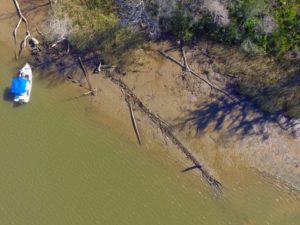
The whereabouts of the long-lost Clotilda remain unknown after Captain William Foster set fire to it in 1860. (Photo by Ben Raines/AL.com)
The 19th-century shipwreck discovered in the Mobile-Tensaw Delta earlier this year, which archaeologists believed might be the Clotilda, has been ruled out as the ill-fated slave ship after further examination, AL.com reported.
Alabama reporter Ben Raines stumbled upon the shipwreck in January after abnormally low tides left a portion of the sunken ship exposed. It was found near the island where Captain William Foster admitted to torching it around 1860 to mask the fact that he was smuggling enslaved Africans. The vessel had reportedly just delivered 110 Africans from modern-day Benin before Foster and his crew set fire to it.
Raines invited archaeologists to the site, who further examined the wreck days after its initial discovery. Their research sparked an all-out investigation by the Alabama Historical Commission and international partners of the Slave Wrecks Project, which include the National Park Service and the National Museum of African-American History and Culture, according to AL.com.
With scuba gear in tow, nearly a dozen archaeologists from the various groups spent days studying the submerged vessel, including portions that were located in deeper waters and were unexposed during the low-tide event. Evidence collected at the time suggested the ship could certainly be the long-lost Clotilda, but further evaluation has since debunked that theory.
“Based on what was known from the first examination, the photos of the site during the low water, it definitely looked intriguing,” said archaeologist Jim Delgado, who spearheaded the investigation. “There was no way to know without this more thorough investigation, with divers in the water, whether this was Clotilda.”
“Even though it is not, the fires have been lit,” he added. “There is a strong will to find Clotilda now. There is international interest in this story now.
The whereabouts of the so-called last American slave ship remain unknown, but an interest in locating it was definitely sparked after news of Raines’ discovery. The descendants of the captives on board the ship at the time are said to be the only slave descendants who know exactly from where their ancestors came. Many of them say renewed interest in the Clotida has helped shed light on their history.
Survivors of the wreck made a home in the U.S. and created a community called “Africatown” just north of Mobile after their passage back to Africa was denied.
“This story has reminded everyone that we are here and that the ship is out here,” said Joe Womack, a descendant of a Clotilda survivor and a community leader in Africatown, told the news site. “This whole episode has finally brought Africatown and its story to everyone’s attention. That’s something we’ve been trying to do for as long as I can remember.”
The hunt for the wrecked Clotilda rages on.


